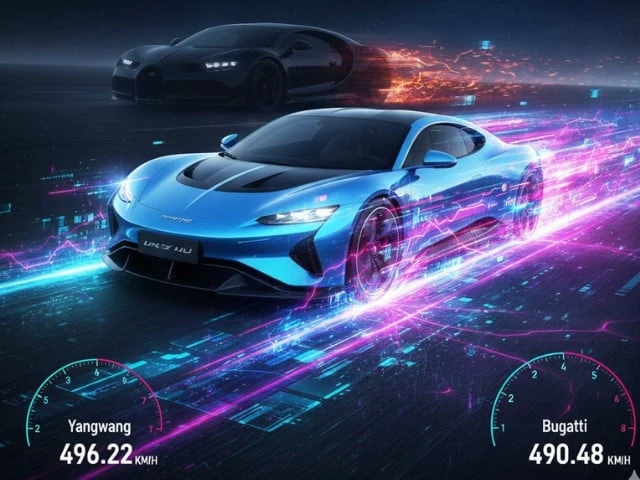Bugatti dethroned: BYD’s electric hypercar hits 496 km/h
China’s Yangwang U9 Xtreme proves EVs can outpace Europe’s combustion royalty

BYD’s luxury sub-brand Yangwang revealed that its U9 Xtreme hypercar had hit a blistering 496.22 km/h (308.4 mph) at Germany’s ATP Papenburg test track. Driven by Marc Basseng, the one-way run edged past Bugatti’s Chiron Super Sport 300+, which topped out at 490.48 km/h (304.77 mph).
For more than two decades, Bugatti has defined the pinnacle of automotive engineering, the kind of engineering marvel that could push beyond 300 mph and leave rivals gasping. But the latest challenge didn’t come from Europe’s traditional luxury heartlands. It came from China.
At first glance, it’s another “fastest car” headline. Look closer, and it’s a convergence of technology and geopolitics.
From W16 to software and batteries
The Bugatti Chiron’s quad-turbo, 8.0-liter W16 engine epitomized Europe’s combustion engineering. The Yangwang U9 Xtreme, by contrast, is entirely electric. It leverages BYD’s decades of investment in blade battery chemistry, thermal management, and electric drivetrains, coupled with DiSus-X body control software. It is a system that actively synchronizes suspension, aerodynamics, and stability at extreme speeds.
For global tech watchers, this milestone underscores a shift in the balance of innovation. China, already dominating mass-market EV adoption, now lays claim to the hypercar crown. That challenges Europe on a cultural front too: Bugatti built its legend on speed. Seeing that crown pass to a Chinese EV brand is symbolic of how technology can reorder prestige as quickly as it disrupts markets.
There are caveats. The record was set in a single one-way run, not the two-way average required by some official bodies to certify a speed record. Only 30 units of the U9 Xtreme will ever be produced, making it more halo product than mass-market revolution.
Still, the fact remains: an electric hypercar from Shenzhen has outpaced Bugatti on Bugatti’s own turf. This isn’t horsepower versus horsepower. It’s algorithms, semiconductors, and battery systems redefining what performance means.
The road ahead
If the world’s fastest car is now electric and Chinese, it raises a provocative question: will the age of combustion-driven supercars fade faster than expected? For BYD, the achievement is more than bragging rights, it’s a signal that the battle for innovation prestige is no longer limited to Silicon Valley or Europe’s luxury marques. The future of speed, like the future of mobility, may well be written in Chinese batteries and software code.



















COMMENTS
Comments are moderated and generally will be posted if they are on-topic and not abusive.
For more information, please see our Comments FAQ